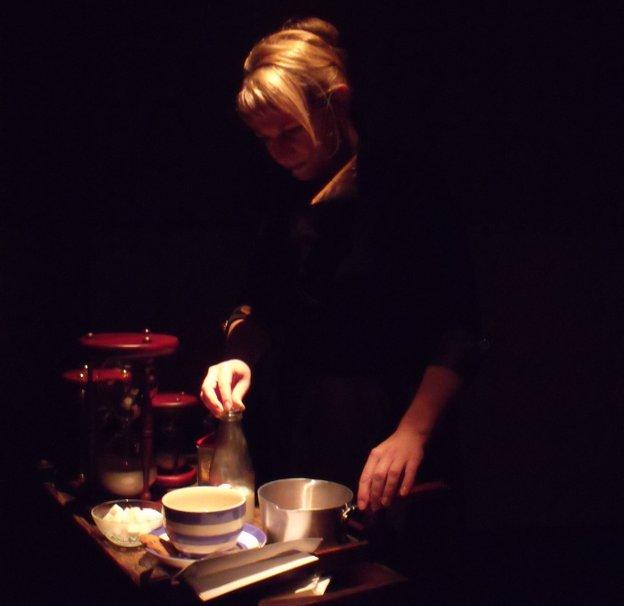Donna Rutherford, caught between memories of the past and projections of an uncertain future, dives into a subject that most people simply try to ignore: the inevitability of becoming old, the rapid passing of time, like the sand in an hourglass; and the shift in the parent/time relationship – specifically, that moment when the natural order seems to reverse itself, and the son or daughter becomes the father or mother of those who once raised them.
Kin, which describes itself as ‘theatre, film, true-life’ is exactly that: a play, a film, a true-life story. Staged with a pleasingly clean-cut scenography and simple set – three TVs and three small tables – the piece sees writer/performer Donna Rutherford present us with six different stories, one of them her own, about how to deal with the ageing of our parents, facing that moment in life when a previously strong and giving person becomes, day by day, slower, more vulnerable, and ever more dependent. There is no character construction – the performer appears as herself, as do the other five guest performers who we meet on-screen.
These five stories from other people are presented as recorded interviews, shown throughout the play, exposing the vulnerability of each person, and the intimacy of their home-life with their parents, as they share precious moments of daily life. The five interviewees are all established theatre-makers who will be familiar to many Total Theatre readers: there is Claire Marshall and Cathy Naden from Forced Entertainment, actor-director Alison Peebles, Richard Gregory from Quarantine and Tim Ingram from Reckless Sleepers. Each gives the audience the gift of their sincerity, their stories offered with no trace of shame or pride in the discussion of this difficult subject, talking freely about their relations with their ageing parents and the fact of getting older themselves.
As the play progresses, Rutherford moves from one table to another, sometimes preparing tea or coffee, or interjecting a small speech or song offering her own observations. Each table has an hourglass upon it, iconic markers that Rutherford turns over at the beginning, bringing time as a real and formal presence into this 60 minute show. The audience literally watches time going by in this atmosphere of intimacy where secrets can be shared.
Facing such a strong work it is hard to tell what makes it, sometimes, a little inconsistent. What occurs to me is that maybe Rutherford should have been as courageous in her aesthetic choices as she was in choosing to deal with such a difficult subject. There is something a little twee about the teatime tables and matched fabrics that perhaps signifies ‘old age’ a little too obviously, and thus diminishes the power of the play. Maybe all of this could be less staged, less beautiful?
Despite this, Kin is a touching play – subtle, delicate and facing truths not often told.


